活动标题
- 5 political advisers brief on Beijing Olympic Games
活动描述
- On March 12 at 3 PM, five members of the Chinese People's Political Consultative Conference (CPPCC), including Liu Jingmin, vice mayor of Beijing and executive vice president of the Beijing Organizing Committee for the Games of the XXIX Olympiad (BOCOG), Cui Dalin, vice minister of the State General Administration of Sport, Zhang Jing'an, president of Science and Technology Daily as well as China's best-known filmmaker Zhang Yimou and the veteran Olympic champion Deng Yaping, attend a press conference in Beijing and answer questions from world media. China.org.cn gives a live coverage of the press conference.
文字内容:
- Liu Chunsheng:
Good afternoon, ladies and gentlemen. With the Beijing Olympic Games fast approaching, the First Session of the 11thh National Committee of the Chinese People's Political Consultative Conference (CPPCC) is hosting this press conference titled: "CPPCC members speak on the Olympic Games." We have the honor today to invite five CPPCC members to answer questions from the press.
2008-03-12 15:04:37
- Liu Chunsheng:
They are: Liu Jingmin, vice mayor of Beijing and executive vice president of the Beijing Organizing Committee for the Games of the XXIX Olympiad (BOCOG); Cui Dalin, vice minister of the State General Administration of Sport; Zhang Jing'an, a member of the leading Party group of the Ministry of Science and Technology and president of the Science and Technology Daily; Zhang Yimou, renowned film director and general director for the opening ceremonies of the 2008 Beijing Olympic Games; Deng Yaping, famous table tennis player, former world-title gold medal winner, and deputy director of the Olympic Village of BOCOG. Before reporters raise questions, we'd like to invite Mr. Liu Jingmin to give us a brief introduction.2008-03-12 15:07:52
- Liu Jingmin:
Good afternoon, everyone. I am very glad to take this opportunity to meet with you and discuss all the Olympic Games organizational work. As of today we have 149 days to go for the Olympic Games. Our organization work has entered a critical stage.
The CPC Central Committee and the State Council have attached great importance on doing an excellent job organizing the Olympics. President Hu Jintao addressed this issue in his New Year greetings, stating that China would go all out in order to ensure that the Olympic Games and Paralympic Games would serve as two events promoting mutual understanding and friendly cooperation between the Chinese people and the rest of the world.
2008-03-12 15:10:58
- Liu Jingmin:
During the ongoing "two sessions", Premier Wen Jiabao and Chairman of the National Committee of the CPPCC Jia Qinglin have both required sound work in the preparation and organization of the 2008 Olympic and Paralympic Games. We're going to present successful games with Chinese characteristics. Deputies to the NPC and members of the CPPCC have paid great attention to this and given much support toward the preparation of the games. Domestic and overseas media have extensively covered our preparations from many angles. I would like to take this opportunity to express my sincere appreciation to all the NPC deputies and CPPCC members as well as to all the friends from the domestic and overseas media.2008-03-12 15:13:36
- Liu Jingmin:
After six-years of unremitting efforts, the preparation for the Beijing Olympic and Paralympic Games has proceeded smoothly, thus laying a solid foundation for holding future games as well.
First of all, the construction of Olympic venues has gone smoothly. The Beijing Olympic Games plans to utilize 37 venues for matches and 56 for training. 36 of the 37 match venues have already been completed. The National Stadium is still under construction, for additional requirements of the opening and closing ceremonies -- it is due to be accomplished in April.
2008-03-12 15:16:37
- Liu Jingmin:
Secondly, a series of testing competition events were successfully carried out. Forty-five items of the "Good Luck Beijing" testing competitions were on schedule, with 35 already held; through these tests we have obtained valuable experience. Venue facilities, technical supporting systems, operational teams, commanding systems, and service provisions have been tested at those events. The results indicated that they basically met the demands of the Olympic Games.2008-03-12 15:18:28
- Liu Jingmin:
Thirdly, preparations for the opening and closing ceremonies and the torch relay are currently under way. At present, the opening and closing ceremonies have entered the drilling stage, and the time procedures for the opening ceremony are basically confirmed. Important projects like the Torch Tower are coming along very well. The first group of actors and actresses has been rehearsing since August 2007. The torch relay will be held from March 24 to August 8 this year. The activity's theme is called the "Journey of Harmony" and the slogan is "Light the Passion Share the Dream". The Olympic Flame will travel to 113 cities in China, 19 cities in five continents of the world, visit Hong Kong and Macao, and it will reach even high places such as Mt. Qomolangma (Everest).
2008-03-12 15:22:43
- Liu Jingmin:
Fourthly, publicity and media coverage have been in full swing. Last year, 100 press conferences were convened with 5,939 domestic and overseas reporters' participation. The carried-out interview ratio reached 78.4 percent. Additionally, we have arranged over 60 visits and interviews for overseas journalists.2008-03-12 15:24:44
- Liu Jingmin:
Fifthly, environmental protection and city traffic improvement endeavors have also been under way. Approved by the State Council, a Beijing Olympic coordination work group on air quality control was established and a blue print was drawn up. The atmospheric quality has been improved for nine consecutive years. In 2007, the number of days with second grade or higher air quality reached 67.4 percent.2008-03-12 15:26:36
- Liu Jingmin:
Currently, Beijing is in the 10th phase of controlling air pollution.
During the first two months of this year, the number of blue sky days increased by 13 days, compared with the same period last year. Moreover, Beijing will take four steps to solve urban congestion. The city has lowered the ticket prices for buses and subways substantially and has been boosting the construction of intelligent communications. Now the Olympics-related subways are operating smoothly and the fifth metro line has already begun operating.
2008-03-12 15:29:48
- Liu Jingmin:
At the beginning of 2008, the BOCOG made an overall plan for this year's work. BOCOG divided the work into four phases: the first phase, from the start of 2008 to April 30, focuses on thorough preparation; the second, lasting from May 1 to July 27 when the Olympic village is to open, will focus on a warm-up for all the staff; the third, from July 27 to September 20 when the Paralympic village is to close, is deemed the operation period; the last, from September 20 to the end of 2008, is allocated as a summary and conclusion of our jobs.2008-03-12 15:32:55
- Liu Jingmin:
To sum up, the tightly scheduled preparations for the Olympic Games and Paralympic Games are orderly and on schedule. I hope you continue following our work and offering joint efforts with us in order to create a high-level event with distinctive characteristics.2008-03-12 15:34:09
- China Central TV:
Director Cui, China won the second largest number of gold medals at the previous Olympic Games. China will host the Olympic Games this year and Chinese people have high expectations for this event. So can you tell us how many gold medals China is expected to win at this Olympics? Is it possible that China may win the highest number of gold medals? And what is the goal for this year's Olympics?
One more question. As we all know drugs are a big headache for international sports events. So what is the attitude of the Chinese government towards this issue? Are there any special measures implemented to deal with this problem at this year's Olympics?2008-03-12 15:37:04
- Cui Dalin:
All Chinese people are hopefully expecting that Chinese athletes will achieve great success at the Beijing Olympics.
It is the responsibility of every Chinese athlete and coach to make their best efforts at the Games. But the Chinese team has never thought of winning the most gold medals at the Beijing Olympics. China is not yet a strong sports power. China lags behind in quite a number of items compared with countries such as the United States and Russia.2008-03-12 15:39:03
- Cui Dalin:
This can be clearly seen at the Athens Games. The US won 103 medals at the Athens Olympics; Russia won 92; China only won 63, 40 and 29 less medals than the US and Russia respectively.2008-03-12 15:40:30
- Cui Dalin:
The number of medals reflects a nation's general competitive sports power. We also noticed that from 2005-2007, at several big games, or on several minor Olympic sports rosters, we still gained far fewer medals when compared with the United States and Russia. So, we are not a strong sports nation, we still lag behind in many areas.
2008-03-12 15:42:14
- Cui Dalin:
We noticed that US teams got very good results in 2007 at the IAAF World Indoor Championships in Athletics and World Swimming Championships. In March, at the World Swimming Championships held in Australia, the US players won 17 gold medals in total. In August, at the athletics championships in Osaka, American players received 14 medals. In these two categories, the US claimed 31 world champions, almost equal to what we achieved in total at the last Olympics in Athens: 32 medals.
2008-03-12 15:44:47
- Cui Dalin:
But it should be noted that taking part in the Olympics is not just about getting a bunch of gold medals. To hold the Olympics in Beijing is a kind of recognition by the international community that acknowledges China's reform and opening up policy, economic growth and social advancement. At the same time, this is also a splendid chance to exhibit our history and culture, to offer a platform for friendly exchanges among athletes of every nation around the globe.
2008-03-12 15:46:44
- Cui Dalin:
It is really vital to spread Olympic ideals and promote the Olympic spirit in China with the largest population in the world. China's participation is not just to win gold medals. We have a number of objectives.2008-03-12 15:47:44
- Cui Dalin:
The first objective is to promote the Olympic spirit and a Chinese sports spirit of hard struggle: this means not getting dizzy over success or losing heart over failure. The Chinese athletes will display our national image to the world by presenting their hard-working, promising spirit together with good sportsmanship.2008-03-12 15:48:51
- Cui Dalin:
Second, the Chinese athletes will give their best during the upcoming Games to win honor for the country.
The third objective is to promote the Olympic cause around the world and encourage friendship with foreign countries and regions via friendly exchanges.
2008-03-12 15:49:47
- Cui Dalin:
The fourth objective is to inspire the Chinese people's enthusiasm toward sports and to encourage more people to participate in the National Keeping Fit Program. The 2008 Games is also expected to stimulate the sports industry and other sports enterprises and to contribute to building a harmonious society.2008-03-12 15:51:57
- Cui Dalin:
I am also very concerned about how many gold medals China will win in the summer Olympics.
But I cannot answer your question since the Games has not yet opened. The fascination of competitive sports lies in its uncertainty. I can tell you the exact number at the closing ceremony.
2008-03-12 15:53:02
- Cui Dalin:
Doping is a common malady in the international sports arena. It spread to China in the middle and late 1980s. The Chinese government has always been a firm opponent of doping use in athletic sports.
2008-03-12 15:55:54
- Cui Dalin:
Early in 1989, the former State Sports Commission put forward the three-S principles to ban doping in sports: stern ban, strict examination and severe punishment. In 1995, China promulgated the Sports Law that contains clear stipulations on anti-doping. In 2004, the State Council published the Anti-doping Regulations, which puts the country’s anti-doping work under a legal framework. In October 2006, Premier Wen Jiabao signed the International Convention Against Doping in Sports, formulated by the United Nations Educational, Scientific and Cultural Organization. China is the first Asian country to sign the pact.
2008-03-12 15:58:55
- Cui Dalin:
We also are paying great attention to providing anti-doping education among Chinese sports teams who are now conducting intensive trainings for the upcoming Games; we want to raise their anti-doping consciousness. During the education, we will strictly follow the three-S principles, observe relevant laws and regulations. At the same time, we have set up the national anti-doping center under the endorsement of the central government. We also are speeding up our efforts in the establishment of anti-doping laboratories.
2008-03-12 16:00:39
- Cui Dalin:
Apart from education, we have introduced an accountability mechanism in all teams competing in the Olympic Games. China’s General Administration of Sports, associations for different sports items and sports administrative departments from different localities have all signed the Liability Paper on Anti-doping. Athletes and coaches also are required to sign a "commitment letter."
In recent years, we have also stepped up anti-doping tests. In 2007, anti-doping tests including in-match and out-match tests exceeded 10,000. We also meted out stricter punishment in some particular cases.
The international community has recognized China’s anti-doping stance and efforts. Mr. Richard Pound, President of World Anti-Doping Agency, gave his thumbs-up for our work after his tour in China, saying that China has set a good example for the world in terms of anti-doping.
I assure all of you that China will send a dope-free delegation to the 2008 Games. Thank you for your question.
2008-03-12 16:03:10
- Reporter:
Ms. Deng Yaping, you have participated in several Olympic Games, and now, as vice director in charge of the Olympics Village, I would like to know, what are your responsibilities regarding the Olympic Village? Comparing the previous Olympic villages, what are the unique qualities of Beijing's Olympic Village? Also, what kinds of services does the Olympic Village provide for the athletes and officials? Thank you.
2008-03-12 16:05:54
- Deng Yaping:
Thank you very much for the question. As an athlete having participated in two Olympic Games and also as a member of the BOCOG, I'd like to tell you that the differences in the Beijing Olympic Village are as follows:
First, in accordance with the provisions of the International Olympic Committee, we have a special manual for each work procedure, for example, designing the Olympic Village. We have carefully followed every requirement in the International Olympic Committee manual.
2008-03-12 16:07:10
- Deng Yaping:
The requirements in the manual of the Beijing Olympic village, for instance, the room area, what kind of services and functions, are not very different from the previous villages. It's mandatory to meet the International Olympic Committee standards. But we do aspire to present something different from the previous villages, and we hope to give the inhabitants a deep, positive impression of Chinese culture, so they are quite different from the Sydney and Athens villages.
In addition to the basic IOC requirements, we are vigorously working on providing humanistic care and superior services.
2008-03-12 16:09:04
- Deng Yaping:
The village is a place where all athletes can relax, where they won't be disturbed by outside factors, and where they can have a better understanding of Chinese culture. We are now considering what kind of cultural activities can help them learn more about Chinese culture. The cultural activity department of BOCOG is primarily responsible for this part of the project. Currently the selection work is proceeding step by step.
2008-03-12 16:11:04
- Deng Yaping:
Let me give you a brief introduction to the basic planning and design of the village. It is divided into three areas. The first one is called the residential area, the second one is the international area, and the last one is the operation area. From the names, we can clearly perceive their functions. The residential area is no doubt a place where athletes and officials of all delegations will live, while the international area is a place to spend their leisure time. The last area is where we comprehensively conduct the management and operations.
2008-03-12 16:13:05
- Deng Yaping:
Here I'd like to stress one point about the international area. Media reporters including you can come to the area to interview athletes via a formal application. But the interview activities are only limited to this area; it also includes our Village Director Park and Flag-raising Square. As you know 205 delegations will take part in the Beijing Olympic Games. The first big thing they will do as soon as they arrive here will be the flag-raising ceremony -- usually that attracts lots of media attention.
2008-03-12 16:15:44
- Deng Yaping:
You can go and participate in the reporting. Meanwhile we have a Peace Square where people can sign their names on the Olympic Declaration. The international area also includes shopping centers. Athletes probably won't have much time to go to other places to shop. At least they can buy some souvenirs, and everyday necessities on this street.
I'd like to stress another point. The village can be considered extremely convenient. Compared with previous villages, this one is only five kilometers away from the main stadium -- the National Stadium. One can even walk to the stadium within a short time.
2008-03-12 16:18:40
- South China Morning Post:
I want to ask two questions. The first question is for Vice Minister of the General Administration of Sport Cui Dalin. I noticed that this is your second time this week talking about possible medals for the Chinese Olympic delegation. As you mentioned just now, answers to this question are only found on August 24. Could you give a few more details about the Chinese delegation's objectives? My second question is for the Vice Mayor Liu Jingmin. Regarding the recent plane hijacking event, have you ever considered safety issues initiated by the hijacking? What effects will the hijacking generate on the Olympic Games?
2008-03-12 16:21:45
- Cui Dalin:
Your first question was addressed when I answered previous questions just now. Our objective is a general one, and it is really hard for me to give you a detailed prediction about any medals we might win. I am sorry that I can't give you a specific answer. Thank you for your question.
2008-03-12 16:23:45
- Cui Dalin:
Like most of you, I got the news of the plane hijacking from the media. Further detailed information about the hijacking is still unavailable at present. BOCOG has been attaching great importance to the safety measures and five widely ranging procedures have enacted to guarantee security.
Firstly, a state first-class security organization has been established using manpower from the Ministry of Public Security, the Ministry of State Security and the Chinese armed forces.
Secondly, an overall scheme and action plan have been made to target all kinds of security problems the Olympic Games might encounter.
2008-03-12 16:25:17
- Cui Dalin:
Thirdly, many communications and exchanges with international security organizations have been conducted. Recently, the International Criminal Police Organization paid a visit to BOCOG and it spoke highly of the security works BOCOG has implemented.
Fourthly, the security work has been closely combined with the construction and operation of Olympic venues. It is always a top priority in each task.
2008-03-12 16:27:39
- Cui Dalin:
Finally, security training targeting security staff and other personnel has been strengthened. In addition, the newly built terminal building at the Beijing Airport has been built with sufficient infrastructure well prepared to guarantee public safety. I believe the security we have will prevent any problems during the Olympic Games.
2008-03-12 16:28:40
- China National Radio:
This question is for Mr. Zhang Jing'an. I have heard that the Ministry of Science and Technology (MOST) is conducting a "technology-based Olympics" campaign collaboratively with several other ministries. As an official in MOST, could you please give us some campaign-running details?
2008-03-12 16:29:39
- Zhang Jing'an:
Good afternoon, ladies and gentlemen. First of all, thank you for your concern about "technology-based Olympics" campaign.
For the first time in history, Beijing has introduced the concept of integrating sciences and technologies into the Olympics. "Technology-based Olympics" is a cornerstone for "Green Olympics" and "People-oriented Olympics". It is also our manifesto and promise. It is the duty and responsibility of the Chinese scientific community to endow the upcoming event with the most advanced technological elements in Olympic history.
2008-03-12 16:30:29
- Zhang Jing'an:
We have formed a team led by the minister of science and technology. The team includes the Beijing Municipal Government, the Chinese Academy of Sciences, the Chinese Academy of Engineering, the Ministry of Education and the China Association for Science and Technology (CAST), along with 13 institutional members. We have also organized six magnificent activities for the campaign and made accomplishments in 1209 projects. All these projects have been basically completed. They have contributed to advanced stadium construction, eco-environmental protection, online information services, food safety and event operations at world-class levels. Now, I would like to brief you on the six-part campaign.
2008-03-12 16:31:00
- Zhang Jing'an:
First, China has independently developed a new type of vehicle integrating advanced energy efficient technology. Over 500 green vehicles will be put into use for the Olympics. In the downtown areas, we have zero-emission vehicles impelled solely by electricity and fuel batteries. In the suburban areas, we have hybrid electric vehicles with fuel battery-powered automobiles generating low emissions. China's clean vehicles are much more technologically advanced than other global counterparts.
2008-03-12 16:32:16
- Zhang Jing'an:
Second, China has developed green energy technologies. For example, a 100 kw solar power station enclosed by the Beijing National Stadium's curtain walls can provide adequate electricity to light all of the stadium's underground parking lots and squares. There are in total 69 projects of this kind. In addition, the LED lighting on the exterior walls of the Olympic multi-purpose TV tower and the Water Cube does not only look beautifully radiant but also they save 70 percent of the normal energy expenditures. The lighting devices have a life span 10 times longer than their predecessors.
2008-03-12 16:33:34
- Zhang Jing'an:
Third, China has adopted water recycling technologies, which enable us to use 80 percent of the rain water and to treat and reuse 100 percent of the waste water in the stadiums.
Fourth, all the 32 Olympic stadiums, whether newly-built, expanded or rebuilt, have adopted new technologies, techniques and materials. The Q460 steel materials, which make up the Beijing National Stadium, are developed and produced solely under Chinese auspices. As far as the Bird's Nest-like structure, unusual concrete techniques and the Water Cube's assembly techniques, among many others, are concerned, China is absolutely second to none in the world.
2008-03-12 16:34:41
- Zhang Jing'an:
Fifth, we have launched a "Beijing No. 1" earth observation satellite in order to provide user-oriented information services. This special satellite can observe the environment of Beijing and its peripheral areas. It can comprehensively monitor and analyze any and all activities during the Olympics.
In addition, we have made it possible that in any of the Olympic stadiums, anyone at any time can use any of the terminal devices to access personalized information services without any language obstacles.
2008-03-12 16:35:28
- Zhang Jing'an:
Sixth, we have developed a special torch. It enables the Olympic flames to continue burning under conditions of low temperature, low oxygen density and strong wind when it is relayed to Mt. Qomolangma.
2008-03-12 16:36:27
- Zhang Jing'an:
The Beijing Olympics will be a glorious event integrated with most technological elements in Olympic history. The major standards of the 2.91 km sq Olympic central areas are world class. They have boosted low carbon economy and industrialization of low carbon technologies. The technology-based Olympics will benefit all of Chinese society and all people. Finally, I would like you, the reporters to tell those who care about Beijing Olympics to have faith in the intelligence and creativity of Chinese technical professionals. They are providing strong technical support to the upcoming Olympics. Thank you all.
2008-03-12 16:37:05
- China News Service:
Yao Ming, the famous Chinese basketball player, has drawn close attention because of his foot injury, what is the probability of his participation in the Games? I have also heard that traditional Chinese medicine will be used for Yao's treatment, what about the attitude of General Administration of Sports towards this?2008-03-12 16:38:51
- Cui Dalin:
Yao Ming is a remarkable athlete and very popular among basketball fans. I was very sorry to hear about his foot injury. He has been looking forward to joining the Games, and so have his fans. The Chinese Basketball Association has kept in close touch with the Houston Rockets recently.2008-03-12 16:39:30
- Cui Dalin:
Yao had a successful operation several days ago. We expect he will recover quickly. But we also insist that athletes should be respected and protected. Whether Yao Ming is able to join the Games depends on himself and his doctors' suggestions. I can tell you now that the Chinese national team has started a new round of training. The national team has been asked to prepare for matches without Yao Ming's attendance and perform well. Thanks.2008-03-12 16:40:08
- Beijing Review:
I'd like to ask Zhang Yimou, could you reveal any details regarding the preparations for the Olympic opening ceremony? And, there are people worrying that if we were to encounter a rainy day, it might affect the performance. Do you have any similar concerns?
2008-03-12 16:41:40
- Zhang Yimou:
I surely can't give you details; otherwise you would have no interest in seeing what will really happen on that night. Currently the ceremony has started full-scale rehearsals; tens of thousands of performers will participate. Now they are rehearsing together or separately in various locations. There are several rehearsal venues in Beijing's suburbs. I certainly hope those performances will be fantastic; I hope we can give the world a grand surprise. I hope we can satisfy all the Chinese people at home and abroad.
I have the same fear as you do: rain is my biggest worry. We have many exigency preplans for rain, moderate rain and storm. I hope that god will bless China, bless us so that we'll have good weather.
2008-03-12 16:43:38
- Zhang Yimou:
Even if we may encounter bad weather, with our exigency preplans, we hope we still could wonderfully showcase the whole ceremony and performance. Otherwise, so many people will prepare for so long but in vain. If there is rain, we will reduce show times; if the rain is heavy, for security reasons, the air performance will be cancelled. We will also watch out for mechanical and technical problems and other unexpected issues. We will make sure that everything runs smoothly, that it is safe and sound. This is our top priority. Now we are actively doing preparations so I hope the whole opening ceremony will make people happy.
I very much hope everything goes smoothly, safe and sound. Really. This is what I pray for every day.
2008-03-12 16:45:53
- Party Building magazine:
The direct economic input is several million. I'm wondering after the Olympics what degree of economic return will occur -- will it reach your expectations? Also, what will be left after the Games? And what specific work did Beijing do in improving the civic virtues? What's the effect now?
2008-03-12 16:46:00
- Liu Jingmin:
First -- on the question of economic returns, I want to stress that the operational outlay of the Olympics derives from market exploitation, not government investments. The national and Beijing municipal finance departments gave many kinds of financial supports, such as reducing some taxes.
The investment regarding environmental protection is comparatively large. We see that great progress has been made in atmosphere, sewage and solid waste treatment. So I think the outlay has garnered an abundant and positive reaction.
2008-03-12 16:47:10
- Liu Jingmin:
Just now you asked what the Olympics would leave as a legacy for the Chinese people. I think there will be many benefits. Besides the hardware harvest, things like Olympic venues, subways and the basic foundations in the city, I feel that the Games will boost the Chinese people's international exchanges and extend the opening-up policy. It also will serve to help us know more about the Olympic spirit and how mass sport can be developed further.
On improving the civic virtues and qualities, we implemented a wide range of activities including the "Welcome the Olympics, Improve Manners and Foster New Attitudes". They have achieved positive results.
2008-03-12 16:48:14
- Macau Asia Satellite TV:
All the people from the Chinese mainland, Taiwan and Hong Kong are allowed to participate in the Olympic Games. But the Macao people are an exception. Director Liu Peng's response is that he will fully support the Macao Olympic Committee in their participation in the Beijing Olympics. He has already consulted with the International Olympic Committee (IOC) regarding this problem several times. So what is the attitude of the IOC? And the second question is for Mr. Zhang Yimou. The magnificent opening ceremony of the Sydney Olympics gives people greater expectations for the 2008 opening Olympic ceremony. No originality implies failure. So I would like to ask if Mr. Zhang Yimou would continue in "Chinese red" style. What's the preparation for the opening ceremony like? Do you have the confidence to match the Beijing Olympic opening ceremony against that of the Sydney Olympics?2008-03-12 16:49:01
- Cui Dalin:
On behalf of Chinese Olympic Committee, we hope the Macao Olympic Committee will join in the Olympic family along with the Hong Kong and the Chinese Taipei Olympic committees. But recently I learned that the IOC has a new rule stipulating that only a sovereign nation can take part in the Olympic Games. The Chinese Olympic Committee is very supportive of Macao's participation in the Olympics. Minister Liu Peng has expressed hope to the IOC on behalf of the Chinese Olympic Committee that Macao could join in the Olympic family. We have been working hard on this issue but have not yet resolved it. We'll continue our efforts in this area.2008-03-12 16:50:51
- Zhang Yimou:
All the people I know love red. It seems really gorgeous to decorate the "Bird's Nest" in red. So I think it's a sure thing -- red will be displayed during the Olympic ceremony performance. But the presentation cannot be demonstrated by a single color. It must be very vibrant, full of all kinds of colors. I loved the Athens Olympic opening ceremony; it was well directed and excellent. Our objective is to make the Beijing Olympic opening ceremony even more wonderful than that of the Athens Olympics. This is our common hope. We have carefully studied the superb performances and opening ceremonies of former Olympiads. We'll learn from all of them and for the show we'll try to display our profound Chinese culture; in this way the Beijing Olympic opening ceremony will be better than past ones and truly magnificent.2008-03-12 16:52:10
- The Straits Times:
My first question is for Mr. Zhang Yimou. Mr. Steve Speilberg quit as the artistic consultant for the opening and closing ceremonies of the Beijing Olympics. Did he make any contribution to the ceremonies before he left? Will his exit influence your overall plan in any fashion? Can you comment on his behavior? And my second question is for Vice Mayor Liu. There may be some demonstrations by foreign human rights organizations during the Olympics, what's Beijing's stance on those issues? Have you have ordered the police or security departments to get ready for such incidents?
2008-03-12 16:53:38
- Zhang Yimou:
I personally feel regret that Mr. Steve Spielberg quit. He came to Beijing twice about half a year ago. We had two discussions with other consultants on some detailed artistic issues. He showed great expectations for the Beijing Olympics at that time. But I don't think his withdrawal will make any difference to the opening ceremony because we have gathered plenty of experts and artists domestically and also from abroad. The whole group is moving forward smoothly.
2008-03-12 16:54:53
- Liu Jingmin:
As to the question of human rights demonstrations, first of all, I'd like to say that the Olympic Games is an opportunity to demonstrate the Olympic spirit. We don't want to mix sports with politics. We don't want to see a global sports gala turn into a political demonstration that goes against the spirit of sports.
People who come to Beijing for the Olympics, no matter what his or her nationality is, should abide by China's regulations. If they want to organize a demonstration, they must apply for permission at the municipal public security department. The public security authorities give approval based on set regulations.
2008-03-12 16:56:54
- China Sports Daily:
"Traffic" has been a common problem faced by every host city of the Olympic Games. I have a question for Vice Mayor Liu Jingmin. What is the traffic situation going to be like during the Games period and what measures will the government take to ease traffic pressure? Shall we take some population diversion measures similar to those taken during the Athens Olympic Games?
2008-03-12 16:58:01
- Liu Jingmin:
There will surely be some population concentration issues in Beijing during the Olympic Games. However, Beijing is experienced in handling such situations.
During the Golden Weeks which last seven days each, Beijing usually witnesses 2 million people flowing into the city during seven days, this number far exceeds the number expected for the Olympic Games, although it lasts for a longer period of time; 16 days. No major problems have occurred to the infrastructure facilities in Beijing during the Golden Weeks. The difference for the Olympic Games is that people will be more concentrated during the Games, especially when they are entering or coming out of the competing venues. We have done research on this and will take corresponding measures.
2008-03-12 16:59:10
- Liu Jingmin:
For example, we will designate special lanes for the Olympic Games totaling more than 280 kilometers. It proved to be effective during the Athens and Sydney Olympic Games. Main roads in the two cities have four lanes in both directions while the main roads in Beijing have six lanes in both directions. Our measures will meet both the Olympic traffic demand and that of other vehicles.2008-03-12 17:00:16
- Liu Jingmin:
Secondly, we will reduce the number of cars on the road during the Games. We conducted a four-day test last August, allowing cars with odd-number plates running for two days and even-number cars running for the other two days. Traffic volume on major roads was reduced by 30 percent during the four days and auto-related pollution was also cut by 20 to 40 percent. We will also adopt the odd-even system for cars before and during the Olympic Games.
Thirdly, we will also cut the number of cross-Beijing vehicles. However, vehicles carrying meat, eggs, vegetables and subsidiary foodstuffs to Beijing residents will be guaranteed for transportation.
2008-03-12 17:01:09
- Liu Jingmin:
A number of measures will be adopted to secure the transportation for the Games and also to balance the need for normal life among citizens at the same time. I do not know much about the population outflow in Athens Games that you mentioned. Athens indeed experienced a phenomenon that, during the Games, some people went on holiday leave. I heard that the Athens authorities encouraged citizens to take vacations during the Games. We are not going to enforce any mandatory leave measures. I think the traffic restrictions can solve the traffic problem.
2008-03-12 17:02:11
- British reporter:
I have two questions for Mr. Zhang Yimou. First of all, I would like to know whether, as in previous opening ceremonies of the Olympic Games, the Beijing Games will invite celebrities to give performances. If so, does it need to be approved by the government in advance? Do some celebrities face pressure from the government forcing them to attend the opening ceremony? The second question is: we know that Tang Wei is a hot movie star, but she was banned from China's media since she starred in the film of Lust, Caution. Ang Lee, the film's director and also an artistic advisor for the Games, has recently issued a statement to show his unhappiness on the decision -- what is your comment on this?
2008-03-12 17:03:19
- Zhang Yimou:
Regarding the first question, certainly some celebrities are going to participate in the opening and closing ceremonies. Besides China's stars, many foreign stars will also be invited. I have not heard of any celebrity facing pressure to come, because we have kept close touch with these celebrities who intend to be present. Whether he or she comes or not, depends on his or her schedule as well as our artistic considerations. Our contacts are open, and we have never heard of any pressure, nor has any star expressed that he or she feels such pressure.
2008-03-12 17:04:50
- Zhang Yimou:
About the issue of Tang Wei, I really don't know. I just read it on newspaper, but I don't know it clearly. People are talking, but I will withhold my opinion because I really don't know anything about this. But I think, for something like this, it's basically showbiz. It is nothing to do with the Olympics fundamentally. Ang Lee is our artistic advisor, and he's a friend of mine. We have discussed various topics such as the Olympic opening ceremony. I have nothing else to say. Thank you.
2008-03-12 17:06:13
- Hong Kong Wen Wei Po:
My question is for Mr. Zhang Yimou. Days ago I saw a report saying that anyone who participated in the opening and closing ceremony of the Olympics will have to sign a confidential agreement. If anyone leaks anything, they will be put behind bars for 7 years. I wonder if you have signed this kind of agreement? Is it the fact that if you leaked something, you would go to jail? At today's gathering, how many details can you reveal? For example, how much money has been invested in rehearsals to date? How many preludes will be arranged? Will Faye Wong perform at the opening ceremony? We all have great interest in those issues.
2008-03-12 17:07:01
- Zhang Yimou:
It is true that everyone who participates in the opening ceremony will have to sign a confidential agreement. Two years ago when I first took this job, I signed a similar agreement.... This is the regulation of the International Olympic Committee. All the confidential rules derive from the IOC's text and we also added and reorganized some. Sign the agreement: this is mandatory. This agreement implies responsibility.
2008-03-12 17:08:09
- Zhang Yimou:
As for the seven-year sentence, I just heard about it these past two days. I wonder who will sentence whom? Will the IOC give anyone a 7-year jail term, or what? I never heard about this. Thus far, all of us who are participating in the opening and closing ceremonies have never committed any breach of confidentiality. We are very careful about this.
Regarding the confidentiality, I feel that this is meant to give all the audience members a big surprise on that day. It's not really a big deal. It's just simple common sense: if I'm shooting a motion picture, if I tell you everything in advance, you would have no interest in watching it. So all of this is kept secret for the attention of the world and the media on that day, especially the core elements, like how to light the fire, and what will the torch be like, all of these things should be kept confidential.
2008-03-12 17:09:09
- Zhang Yimou:
There are many other details that concern us all but I really can't say any more. I just want to say that Chinese culture has a very long history, and is so abundant. Chinese people in our society have so many expectations of all different kinds. If you go to the Internet, you will see plenty of discussions. I receive lots of mail every day, offering suggestions and ideas, so much. So how can we convey tons of cultural information to the whole world? Our performance will only be a little more than 50 minutes. The whole three and half hours will have other important processes, especially the athletes' march-in ceremony, which will takes up nearly 2 hours. It is completely impossible to convey all of China's cultural codes in 50 minutes. We can only add in several crucial points. For me, I hope these points will greatly zoom in on humanity and sensibility. I feel this focus is universal.
2008-03-12 17:10:09
- Zhang Yimou:
For example, we'd like to first ask, who are we? This is first sentence. The second is, you and we are a family. "One World, One Dream" will be a sensible and humane explanation as I interpret it in my way.
Moreover, we have to adopt the simple and understandable approach, so that foreigners understand what we are conveying. This is what the IOC has constantly stressed: not only for foreigners, but also for the world's youth to understand. So we must find such a way. As for who will sing, I can't tell you. If I tell you, there will be no saved surprise. Thanks.
2008-03-12 17:11:28
- China Youth Daily:
I have two questions. The first one is that according to meteorological statistics, August is frequently a time of intense airflow in the Beijing area. During the Games period, especially during the opening ceremony, once a rainstorm, thunderstorm, tornado or hailstorm occurs, what kind of measures will BOCOG take to deal with the situation? Is there any emergency plan? Will you ask meteorological departments to conduct artificial rain-averting or hail-averting work? Second, Mr Liu Jingmin said just now that this year the Olympic torch relay will reach Mount Qomolangma, where the topography is varied and weather is unpredictable. How will you guarantee the smooth operation of the torch relay?
2008-03-12 17:13:34
- Liu Jingmin:
Meteorological work is a very important aspect of the preparatory work for the Beijing Games. The China Meteorological Administration and the Beijing Meteorological Administration attach great importance to this work. They have organized special task groups and conducted a series of research projects in the past two years. They have collected climate information in Beijing area, especially during the Games period, over the past several decades. They have made detailed calculations and offered many forecast suggestions. Meanwhile, they have conducted a detailed analysis around each stadium. During the Games, they will provide an hourly weather forecast. Very recently, BOCOG wrote a letter to the China Meteorological Administration and the Beijing Meteorological Administration to express great appreciation for their massive efforts.
2008-03-12 17:14:28
- Liu Jingmin:
Weather on the day of the opening ceremony is really a big concern. The China Meteorological Administration made a prediction at a recent press conference, noting that the probability of rain on the opening day of the Games is less than 10 percent based on the analyses of relevant data of the past decades. The probability of heavy rain is even lower. A tornado, which you mentioned in your question, is even more unlikely. Meanwhile, we are making an emergency plan aiming to minimize any adverse affects posed by bad weather.
2008-03-12 17:15:07
- Liu Jingmin:
Allowing the Olympic torch to reach the summit of Mt. Qomolangma is a highlight of the whole torch relay event. This highlight was raised when Beijing bid for the 2008 Games. It's expected to demonstrate the themes of Green Olympics, High-tech Olympics and People's Olympics. While preparing for this activity we received much support from our meteorological departments, the General Administration of Sports and the government of the Tibet Autonomous Region.
A test was conducted last year on the summit of Mt. Qomolangma during which a telefilm was shot. The test was successful so now we are confident in dealing with any problems caused by weather during this activity. Thanks to the joint efforts with meteorological departments, we feel capable of accomplishing our task.
2008-03-12 17:16:21
- Zhang Jing'an:
I would like to say something technical. There are three big difficulties we need to solve: strong winds, oxygen deficits and freezing temperatures. We did experiments many times to resolve these problems. Now, I can tell you confidently that the torch will burn brightly on the mountain top.
2008-03-12 17:17:30
- China Radio International:
I have a question for Mr. Liu. Last year when I visited the Water Cube, rumor had it that after the Games this venue would be reestablished as an indoor water park. Would you please release something about the use of the Olympic venues for the future? And if they are going to be open to ordinary people, what will the fee be, will it be more expensive than other places?
I have another question for Mr. Zhang Yimou. There's an activity on the smiling faces collection. I wonder if it doesn't relate to secrets, how's this activity doing now? How will it be used in the opening or closing ceremonies?
2008-03-12 17:18:14
- Liu Jingmin:
The use of Olympic venues after the Games is a very important question. I remembered in 2002 when the State Council discussed the layout and design of the major Olympic venues, the state leaders brought forward four requests. The last one pays more attention to the post-game usage.
BOCOG emphasized this task. For instance, when inviting public bids, one criterion we checked was whether it represented an internationally based conglomerate or not, and wasn't simply a minor construction or architectural firm. We'd ask: do you have an operating scenario? We discussed this with our expert team. If it could be operated after the Games and the cost was manageable, the company had rights to win the bid.
2008-03-12 17:19:24
- Liu Jingmin:
Meanwhile, regarding the layout, we did in-depth research on every venue, considering whether it was economically feasible and whether it would be sustainable. Taking the Water Cube as an example, it has 17,000 seats. After the Games, 6,000 will be reserved and the other 11,000 will be open to the public as the entertainment and sports clubs. If you have been to the Water Cube, you might see we circled one space, that is a water park. It's not easy to find a place to swim during the Beijing winter. The park is built on a large scale to meet the needs of our citizens.2008-03-12 17:20:11
- Liu Jingmin:
We have worked out the operational plans of each venue for their post-Games use. The Beijing Municipal Commission of Development and Reform, in order to provide long-term services for local citizens, has initiated a new topic covering how to implement these plans.
I am sure that local residents will be able to afford the venues after the Games. For example, we have signed an agreement with the operator of the Bird's Nest, insuring that reasonable ticket prices should be available for the local residents.
2008-03-12 17:21:23
- Liu Jingmin:
I believe all Olympic stadiums will continue to perform their role after the Games. They will become good places for citizens to entertain themselves and exercise.2008-03-12 17:22:24
- Zhang Yimou:
We have collected children's smiling faces from all over the world. We have got a great many of them. I cannot help looking at them once every few days. I have a feeling that when you look at the smiling faces one by one, they'll touch you much. Different children with different skin colors have one thing in common: they all smile quite radiantly.
I can disclose one small detail. The smiling face performance will be put on at the end of the art performance. We'll display to the world thousands of smiling faces from all corners in a special instant. I believe that instant will be very touching. Because we all hope that mankind will have a better future and that our world will have a bright future. Thanks!2008-03-12 17:23:20
- Liu Chunsheng:
Because of time limit, we have to end the press conference. We thank all of the CPPCC members and reporters for coming today.2008-03-12 17:24:07
图片内容:
 The press conference location
The press conference location Staff from China.org.cn are adjusting equipment used for the live webcast
Staff from China.org.cn are adjusting equipment used for the live webcast The photographers' stand
The photographers' stand Foreign journalists getting ready for the press conference
Foreign journalists getting ready for the press conference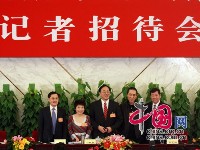 5 political advisers attending the press conference
5 political advisers attending the press conference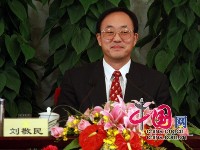 Liu Jingmin, vice mayor of Beijing and executive vice president of BOCOG
Liu Jingmin, vice mayor of Beijing and executive vice president of BOCOG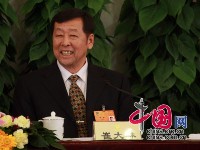 Cui Dalin, vice minister of the State General Administration of Sport
Cui Dalin, vice minister of the State General Administration of Sport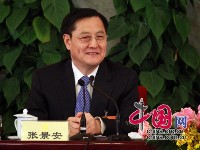 Zhang Jing'an, president of Science and Technology Daily
Zhang Jing'an, president of Science and Technology Daily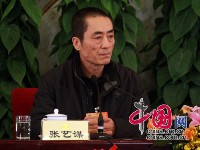 Zhang Yimou, the general director of the opening ceremony of the Beijing Olympics
Zhang Yimou, the general director of the opening ceremony of the Beijing Olympics Deng Yaping, the veteran Olympic champion and vice director of the Olympic Village
Deng Yaping, the veteran Olympic champion and vice director of the Olympic Village A CCTV journalist is asking questions
A CCTV journalist is asking questions Cui Dalin is taking quesions
Cui Dalin is taking quesions Deng Yaping is taking questions
Deng Yaping is taking questions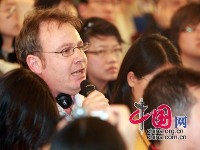 A journalist from South China Morning Post is asking questions
A journalist from South China Morning Post is asking questions A journalist from China National Radio is asking questions
A journalist from China National Radio is asking questions Zhang Jing'an is taking questions
Zhang Jing'an is taking questions The scene of the press conference
The scene of the press conference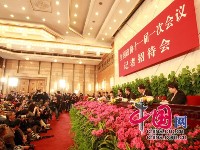 Political advisers are taking questions
Political advisers are taking questions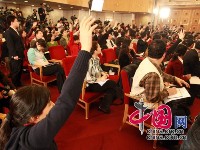 Journalists raise their hands to get a chance to ask questions
Journalists raise their hands to get a chance to ask questions A journalist from Beijing Review is asking questions
A journalist from Beijing Review is asking questions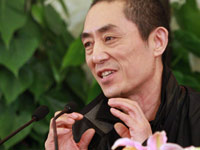 Zhang Yimou is taking questions
Zhang Yimou is taking questions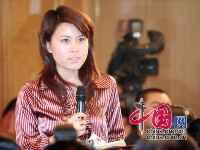 A MASTV journalist is asking questions
A MASTV journalist is asking questions A journalist from Wenweipo is asking questions
A journalist from Wenweipo is asking questions A journalist from China Radio International is asking questions
A journalist from China Radio International is asking questions

